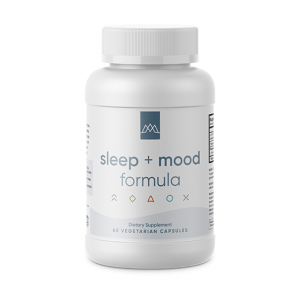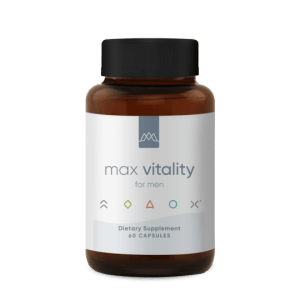The Truth About Testosterone
Is Testosterone Just for Men?
You might consider testosterone as a “guy’s hormone” that impacts things like sex drive. While that’s true to some extent, women also make small amounts of this hormone. For men, testosterone is the most important sex hormone.[1]
What does Testosterone Do?
Testosterone helps regulate many critical functions in men, including:
- Sex drive
- Bone mass
- Fat distribution
- Muscle mass and strength
- Memory and thinking
- Sperm production
If you want to stay lean, active, and strong as you grow older, maintain healthy testosterone levels.[2] Unfortunately, testosterone levels start to decline around the age of 30.[3] It then drops gradually, about one to two percent every year.[4] Nearly 39 percent of men 45 and older have low testosterone.[5]
What Happens if Testosterone is Low?
 Declining levels can lead to signs and symptoms that include:
Declining levels can lead to signs and symptoms that include:
- Low sex drive
- Difficulty maintaining an erection
- Fatigue
- Bone loss
- Muscle loss
- Weight gain
- Mood disorders such as anxiety and depression
Those and other issues can impact self-esteem, energy levels, and much more. Low testosterone can also contribute to other health problems.[6] One study found that over 41 percent of men with low levels of testosterone often have two or more chronic diseases, such as high blood pressure and type 2 diabetes.[7]
If you have signs and symptoms of low testosterone, talk with your healthcare practitioner about ways to increase levels, including hormone replacement therapy.
6 Tips to Boost Testosterone Naturally
Factors such as obesity and not exercising often contribute to testosterone decline, even in younger men. [7] That means you have plenty of ways to support healthy testosterone levels. These six strategies can help.
- Eat the Right Nutrients
If you want to improve testosterone levels, start with your diet.[8] A few critical nutrients in whole, unprocessed foods play key roles in healthy testosterone. They include:
- Zinc contributes to testosterone production. Oysters, grass-fed beef, and nuts provide good amounts of this mineral.[9]
- Magnesium can increase testosterone levels.[10] Leafy greens, nuts, and seeds are good sources of this mineral.
- Vitamin D in wild-caught fish and egg yolks can improve levels of testosterone.[11]

- Omega-3 fatty acids in wild-caught fish can support testosterone metabolism.[12] Hemp seeds, flaxseeds, and chia seeds also provide plant-based sources of these omega 3s. We’ve combined all three seeds in our Essential Bars, which make a delicious and healthy snack.
 Our Core and Advanced Plans both provide ideal amounts of nutrient-rich foods that support healthy testosterone levels. Recipes like our Basil-Walnut Egg Scramble make a delicious way to get these and other nutrients.
Our Core and Advanced Plans both provide ideal amounts of nutrient-rich foods that support healthy testosterone levels. Recipes like our Basil-Walnut Egg Scramble make a delicious way to get these and other nutrients.
Even with the healthiest diet, you might not get all the nutrients you need to thrive. Our Daily Essentials for Men provides the vitamins, minerals, and other nutrients that can cover the bases you may not get from food.
Along with a Men’s Multivitamin and Optimal Omega, we’ve included extra amounts of key nutrients such as vitamin D3, B vitamins, magnesium, and probiotics that are often missing in our diets.
2. Maintain a Healthy Weight
Being obese can increase your risk of low testosterone. One study found that obese men were 2.4 times more likely to have low testosterone levels.[13] A ketogenic diet, which includes plenty of delicious foods that support healthy testosterone levels, makes an ideal way to lose weight and keep it off.
3. Focus on Fitness
Exercise can help you lose weight, boost your mood, and help support healthy testosterone levels. Studies show that men who exercise regularly have higher testosterone.
Resistance training and weight lifting are the best ways to increase your testosterone, but any type of exercise is ideal.[14] Our Max T3 program provides a full-body, testosterone-boosting workout in just 12 minutes.
4. Minimize Toxins
The food we eat, water we drink, air we breathe, and products we use daily contain thousands of chemicals.[15]
Some of these chemicals, called endocrine disruptors, can inhibit how much testosterone your body makes. They reside in plastic bottles and containers, liners of metal food cans, detergents, food, cosmetics, and other products you use daily.[16]
There are over 1,000 endocrine-disrupting chemicals.[17] One is bisphenol A (BPA), found in some bottled waters and canned products, can lower testosterone levels.[18] Learn more about how to lower your exposure to toxins here.
5. Improve Your Sleep
The body releases the majority of testosterone during sleep. In healthy young men, testosterone levels drop 10 – 15 percent when you’re deprived of sleep.[19] To optimize testosterone levels, aim for eight hours of solid, uninterrupted sleep every night. Take our Sleep + Mood Formula if you have trouble falling or staying asleep.
6. Incorporate Nutrient Support
 Eating healthy and maintaining good habits can keep your testosterone levels healthy at any age. On top of that, research shows that specific nutrients — some used for thousands of years — can improve testosterone levels.
Eating healthy and maintaining good habits can keep your testosterone levels healthy at any age. On top of that, research shows that specific nutrients — some used for thousands of years — can improve testosterone levels.
We’ve combined these nutrients, which work even better together, in Max Vitality for Men. This unique formula contains:
- Tribulus: Used in Chinese and Indian medicine to improve sexual function in men.[20]
- Tongkat ali: Supports normal testosterone levels, sexual desire, fertility, mood, and energy.[21]
- Horny Goat Weed: An herb used as a traditional remedy in China for centuries for erectile dysfunction, low libido, fatigue, and more.[22]
- DIM and chrysin: Helps safely manage testosterone levels. [23] [24]
- Ginkgo biloba: Improves blood flow. [25]
- Boron: Can improve testosterone levels.[26]
Just two capsules every day provides these nutrients to support healthy testosterone levels. Combined with a healthy diet and lifestyle, Max Vitality for Men can support healthy testosterone levels to provide peak energy, focus, performance, and sex drive at any age.
References
[1] https://www.healthline.com/nutrition/8-ways-to-boost-testosterone
[2] https://www.healthline.com/health/benefits-testosterone
[3] https://www.healthline.com/health/what-is-testosterone
[4] https://www.health.harvard.edu/drugs-and-medications/testosterone–what-it-does-and-doesnt-do
[5] https://www.uwhealth.org/health-wellness/what-you-need-to-know-about-low-t/51045
[6] https://www.webmd.com/men/what-low-testosterone-can-mean-your-health#2
[7] https://www.nature.com/articles/s41598-018-24347-6
[8] https://www.healthline.com/health/low-testosterone/boosting-food
[9] https://www.healthline.com/health/testosterone-and-zinc#zinc-and-hypogonadism
[10] https://www.ncbi.nlm.nih.gov/pubmed/20352370
[11] https://www.ncbi.nlm.nih.gov/pubmed/21154195
[12] https://www.ncbi.nlm.nih.gov/pmc/articles/PMC5613343/
[13] https://www.webmd.com/men/what-low-testosterone-can-mean-your-health#1
[14] https://www.healthline.com/nutrition/8-ways-to-boost-testosterone#TOC_TITLE_HDR_2
[15] https://www.nature.com/articles/d41586-019-00441-1
[16] https://www.niehs.nih.gov/health/topics/agents/endocrine/index.cfm
[17] https://www.hormone.org/your-health-and-hormones/endocrine-disrupting-chemicals-edcs
[18] https://ehp.niehs.nih.gov/doi/full/10.1289/EHP150
[19] https://www.ncbi.nlm.nih.gov/pmc/articles/PMC4445839/
[20] https://www.ncbi.nlm.nih.gov/pubmed/26727646
[21] https://www.ncbi.nlm.nih.gov/pubmed/12670032
[22] https://www.webmd.com/men/horny-goat-weed-epimedium
[23] https://www.ncbi.nlm.nih.gov/pubmed/21486424
[24] https://www.ncbi.nlm.nih.gov/pubmed/29247772
[25] https://www.healthline.com/nutrition/ginkgo-biloba-benefits




